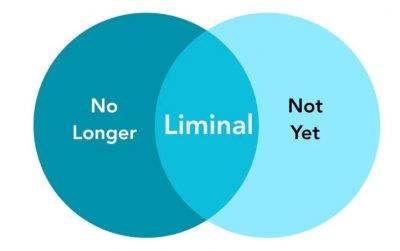
Master the Liminal
26th Sep 2019How often have you wished other people would ‘get’ the future that you see possible? Yesterday I was with a client who was expressing his frustration that his managers and teams just didn’t get the importance of operating differently. It’s a common challenge, right? You’re out there leading into a new future, while others furiously hold onto their existing ways of operating.
There’s a word I’ve come across lately that can help us with this challenge: liminal. From the Latin limen, it means threshold. It’s the place between no longer and not yet. The space between the old and the new.

Great dramatic stories hinge on the power of the liminal space. Joseph Campbell’s archetypal hero’s journey asks the protagonist to leave behind the known, the familiar, the comfortable, and take a leap into the unknown. Many a powerful story has this thread underpinning the drama. Think of Woody in Toy Story, Frodo in Lord of the Rings, Luke in Star Wars. It speaks to the eternal tension of seeking certainty while at the same time wanting novelty.
In my own life, I know that to be in the liminal space isn’t comfortable. Years ago, my Kiwi wife and I were living in Perth, Western Australia. For a while, she’d been saying that she was keen to move back to New Zealand sometime. And for years, I avoided the conversation. I love the hot weather, amazing beaches and laid back lifestyle in WA, and I was in no mood to consider living in a colder place at the ends of the earth. Leaving behind my awesome life was too scary to contemplate. Going into the liminal was not something I wanted to entertain.
But here’s the thing. We’re always in a liminal space to some degree. Our bodies are always ageing. Our relationships with others are always evolving. Our organisations are always adapting to changing forces. The world we live in is not the same today as it was a year ago. Liminality is everywhere.
So we might as well learn to master it.
It reckon this is hugely important given the amount of unrest in the world. A friend of mine reflected on Facebook this morning after visiting the UK for a few weeks. “There is so much unrest, you can taste it, and feel the way the disquiet silently wraps around you.”
While she might be talking about the effects of Brexit, I think this sentiment can equally be observed in our organisations, our teams and even ourselves. With the threat of change ever-present, you can either succumb to the ‘disquiet silently wrapping around you,’ or you can find ways to work with it.
Here are some productive ways you can master the liminal:
- Name it
Winston Churchill once said “occasionally a man stumbles over the truth. Most dust themselves off and continue walking as though nothing had happened.” Denial is easy, but it in the end, it doesn’t serve us.
The first step in mastering liminality is to name what’s changing. Call the truth out. “Hey, here’s what I’m noticing – it seems as though our customers aren’t engaging with us like they used to. What are you guys seeing?” If you think something is changing, it’s healthy to name it. Once on the table, it’s there to be seen, explored and shaped.
- Frame it
Frame what’s not changing. This helps provide a sense of perspective to make things more manageable.
Here’s Amazon’s Jeff Bezos on this idea:“I very frequently get the question: ‘What’s going to change in the next 10 years?’ And that is a very interesting question; it’s a very common one. I almost never get the question: ‘What’s not going to change in the next 10 years?’ And I submit to you that that second question is actually the more important of the two, because you can build a business strategy around the things that are stable in time.”
- Game it
With liminality comes opportunity. If we treat the space between as a game to be played, rather than a torture to be endured, we can create all sorts of new possibilities.
It took me a long time to learn this lesson. With my New Zealand move, what helped me step into the liminal space was to turn the whole thing into a game. While still living in Perth, I began to ask myself questions like:
- What’s the opportunity for me here?
- What could I create that I haven’t yet been able to?
- What can I now finally let go of?
- What might I learn?
In asking these questions, I gradually became the author of my new chapter. What was once ‘not yet’ became my new reality. It was one that I had created, and as a result, I quite liked!
When we can be comfortable in ambiguity, we’re more effective as leaders. It’s time we embraced that. Leading others into change – the liminal space – requires us to be willing to be in it with them. Only then can we develop the empathy required to meet them where they’re at. And when we can empathise, we can better connect, collaborate and co-create a new future.
What helps you be effective in the liminal space?
For more posts like this, check out:
- Stepping into Complexity: a story of leaders being OK with not knowing
- Being on the Edge: how to explore newness with curiosity
- How to Navigate the Messiness of What’s Next: charting your career transitions
- This is Hard: the power of vulnerability
Photo Credit: Mike Soulopulos
Like this post? When you’re ready, here are three ways I can help you further:
- Sign up to my ‘Thinking from the Edge’ newsletter to get tips, insights and early release information that I don’t share on the usual social channels. Delivered fortnightly to your inbox.
- Get my book, Change Makers: How to make your mark with more impact and less drama. It’s available here.
- Come along to one of my Change Makers breakfast sessions to learn more about how this game-changing programme can amplify you and your people’s ability to have more impact.

